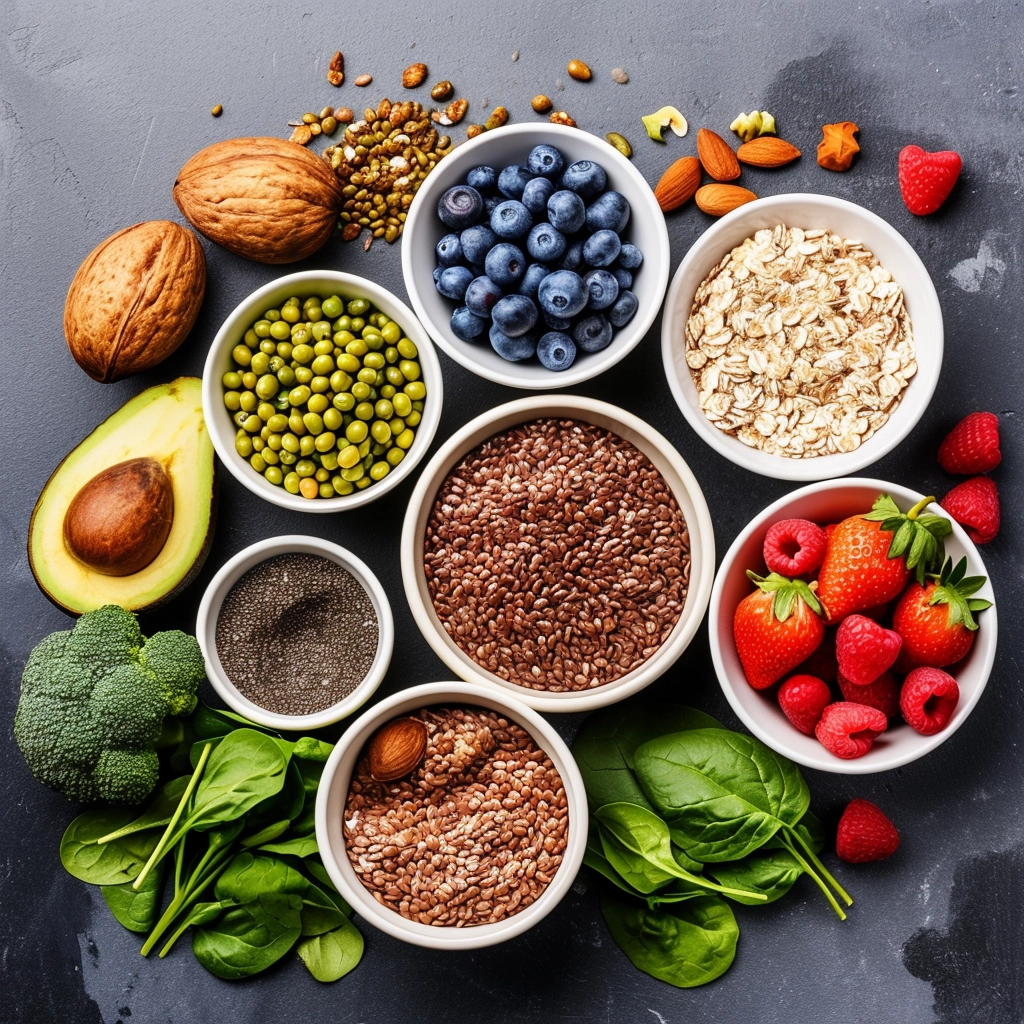Studies show that fiber can support healthy digestion and lower the risk of chronic conditions, making consuming an array of whole plant foods such as fruits, vegetables, nuts, and beans an easy way to meet recommended intakes for fiber consumption.
Gut bacteria, or the gut microbiome, feed off of dietary fiber by fermenting it into short-chain fatty acids that offer multiple health advantages. Fiber also keeps waste moving smoothly through your digestive tract to help avoid constipation and maintain regularity in digestion.
Digestive Regularity
Fiber helps your digestive tract function more smoothly by preventing constipation and supporting regular bowel movements. Fiber also adds bulk to stool, lubricates the colon, and facilitates easy waste disposal through your bowels.
Your intestinal bacteria feed off fermentable fiber to produce short-chain fatty acids that nourish your colon lining while also helping prevent harmful bacteria that could otherwise lead to inflammation, bloating, and other symptoms associated with poor digestion.
A diet rich in fiber also encourages beneficial gut bacteria and may reduce your risk for diverticulitis, a condition in which pockets form in your colon walls. Good sources of fiber include whole foods like fruits and vegetables, as well as low-fat popcorn and whole-grain crackers. If you are new to eating this way, gradually increase your fiber consumption over several weeks, as too much too quickly can cause gas, bloat, and abdominal discomfort; be sure to drink enough water as this will prevent dehydration.

Preventing Constipation
Your gut microbiome thrives when fed an adequate supply of fiber, helping prevent constipation. Without enough fiber in your digestive tract, bad bacteria can overrun and lead to issues like bloating, gas, and discomfort.
Beans, berries, and vegetables (along with fermented dairy products like kefir) contain soluble fiber that escapes digestion in the small intestine and is fermented by friendly gut bacteria in the colon, producing short-chain fatty acids essential to their survival. As more friendly bacteria consume this food source, they multiply and flourish, resulting in improved gut barrier function and decreased inflammation.
Studies published in Animal Nutrition indicate that individuals eating high-fiber diets typically experience more frequent and softer stool than those on low-fiber diets, most likely because insoluble fiber’s broom effect helps soften and bulk stool while stimulating the intestines to contract in an undulating fashion, which propels stools along, an important factor in avoiding constipation.
Balancing Blood Sugar Levels
Fiber helps regulate blood sugar levels, helps prevent insulin spikes, and provides a more reliable energy supply. Furthermore, it assists your digestive system with the absorption of vitamins, minerals, and essential fatty acids.
A diet high in fiber can help protect against digestive conditions like diarrhea and constipation by controlling the frequency and weight of stool production by absorbing water and adding bulk. Furthermore, fiber can lower colon disease risks by helping your gut bacteria convert resistant starch into short-chain fatty acids that benefit your digestive tract.

An abundance of fiber from different sources is important in creating a diverse, healthy gut microbiome. Soluble fiber has been shown to bind potentially harmful compounds found in your digestive tract, such as excess estrogen and unhealthy fats, helping them pass more quickly through and limiting how long they remain harmful in your body. Furthermore, resistant starch (an insoluble fiber found in whole grains and many fruits and vegetables cell walls) is broken down and metabolized by gut bacteria, helping keep digestive health at peak performance.
Weight Management
A high-fiber diet can be an effective tool in managing weight, providing filling and satisfying meal options that promote the growth of beneficial bacteria – leading to lower risks of serious digestive conditions like diverticulitis (outpouchings in the colon wall).
Fiber can be found in whole grains, vegetables, fruits, and beans; it plays an essential role in keeping bowel movements regular and helping prevent constipation. Studies have also demonstrated that individuals who eat plenty of fiber tend to experience fewer issues related to diverticulitis, hemorrhoids, or other gut conditions.
Not only can consuming more fiber increase your microbiome, but it can also aid digestion by decreasing inflammation and stimulating the production of butyrate. Furthermore, fiber can help you maintain a healthy weight as well as lower risks associated with diabetes, heart disease, and inflammatory bowel diseases.
Dietary fiber is an indigestible carbohydrate found in plant foods like whole grains, vegetables, fruits, and beans that offers many health benefits, such as supporting gut bacteria health, regulating blood sugar levels, and alleviating constipation.
Supporting Beneficial Gut Bacteria
Dietary fiber is broken down by beneficial bacteria in the colon to produce short-chain fatty acids (SCFAs) that lubricate and promote efficient movement of waste through the large intestine. The amount of fermentation depends on factors like polymerization degree, particle size, solubility, and viscosity. Studies indicate that an increase in fiber consumption correlates with enhanced gut microbiota diversity as well as reduced risks of type 2 diabetes.
Eating a variety of fruits, vegetables, whole grains, and other plant-based foods is essential to getting adequate fiber intake. Following a low-fiber diet or rapidly increasing fiber consumption can alter your gut microbiome significantly and cause digestive distress such as gas, diarrhea, intestinal blockages, or more serious conditions like diverticulitis – where pouches form in the large intestine, which traps waste – but regular fiber consumption will quickly restore a healthy microbiome – check out the Blue Cross Virtual Well-Being webinar here to find out more!

Reducing the Risk of Colon Diseases
Fiber consumption is essential for regulating bowel movements, controlling blood sugar levels, and maintaining a healthy weight. Incorporating more fiber into daily meals can also help protect against digestive disorders, chronic diseases, and colon cancer (2-3). Gut microbiome bacteria feed off fermentable or insoluble fiber (depending on whether they can be digested by enzymes that the body cannot produce) that the bacteria consume and produce short-chain fatty acids that reduce systemic inflammation while improving colon function (4-13).
Insoluble fibers found in fruit and vegetable skins, as well as grain husks, help combat constipation by absorbing water in your digestive tract and increasing stool bulk, creating soft bulkiness (14) that stimulates your intestines to contract undulatingly and sweep away stools (known as “broom effect”). While too much fiber may lead to gas and abdominal discomfort at first, this usually subsides as your body adjusts to it.
Promoting Overall Gut Health
Fiber is one of the primary reasons why eating whole plant foods is beneficial to our health, supporting gut microbiome health while impacting other factors as well.
Studies have demonstrated that people on diets rich in fiber enjoy a greater diversity of gut bacteria than those who do not consume fiber-rich food. In contrast, low-fiber diets can upset this balance and increase risks associated with certain health conditions.
Gut bacteria use fiber to produce short-chain fatty acids (SCFAs), which provide energy and support the overall health of your colon wall.
Foods rich in both soluble and insoluble fiber include berries, nuts, seeds, beans and lentils, whole wheat, and oats. To get enough fiber in your diet, aim to eat a varied selection of minimally processed fruits and vegetables, whole grains, and legumes – as well as add probiotic foods such as kimchi kraut sauerkraut to your daily regimen.
Conclusion
Ensuring adequate fiber intake is vital for gut health, regularity, cholesterol levels, and maintaining stable blood sugar. Fiber also feeds the good bacteria in your gut while supporting colon wall health, lowering heart conditions risk as well, and providing quality sleep and reduced stress levels.
Diets high in fiber may lower the risk of chronic diseases and help protect against cancer, diabetes, obesity, and depression, among many other ailments. Fiber can also improve lung health by reducing inflammation and encouraging healthy gut bacteria cultures – thus decreasing COPD risk and helping prevent COPD altogether.
Aiming to meet the recommended daily fiber intake requires choosing whole plant foods rich in soluble fiber, such as oatmeal or bran cereals, legumes, raw vegetables, berries, and potatoes; alternatively, you could take supplements like psyllium or methylcellulose powders or wafers – drinking plenty of water is also crucial as this will aid digestion and absorption. A diet low in fiber has been linked to higher risks of heart disease, obesity, and other medical issues.

